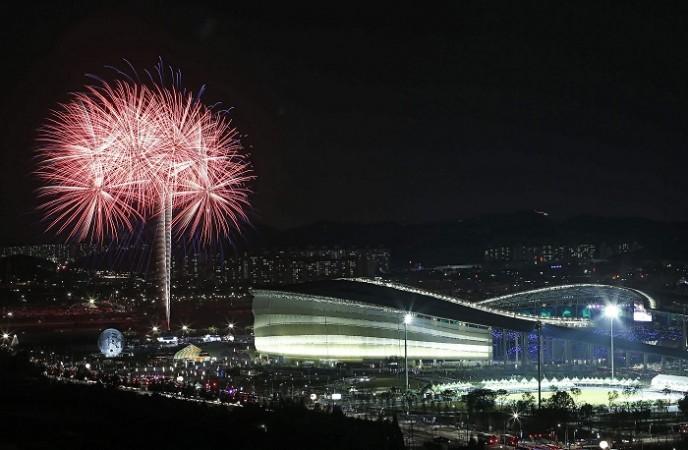
The curtain fell on the Incheon Asian Games on Saturday after 16 days of tough competition by participating athletes and friendships shared by billions of sports fans on the continent, but with familiar results -- China placed first, South Korea second and Japan third in the medal standings.
Under the slogan of "Diversity Shines Here," more than 14,000 athletes and staff from 45 countries have competed for 439 gold medals in 36 sporting disciplines. Fourteen new world records were rewritten here in archery, shooting and weightlifting, with many fresh Asian records.
China cemented their status as the continent's sports powerhouse, topping the medal table with a total of 343 medals, including 151 gold.
Hosts South Korea came in second with 79 gold, outnumbering Japan who gained 47 gold medals. North Korea did well in Incheon, having earned a more-than-expected 11 gold, with their weightlifters setting four world records.
With all these hard-fought competitions coming to an end, the closing ceremony started at Incheon Asiad Main Stadium to celebrate athletes for their hard work as well as inspire them for future efforts.
The main theme of the ceremony was "Our Cherished Memories of Incheon," directed by Jang Jin, a South Korean filmmaker who also managed the opening ceremony two weeks ago.
The grand ceremony began with fireworks woven with pop music and artistic performances, including a taekwondo demonstration by members of Kukkiwon, the global headquarters of the martial art.
On the wide screens, video footage showed the highlights of the continent's biggest sporting event, recapturing sports stars and their competitors' excitement, joy and disappointment.
After another video clip showing Incheon residents during the competition was played, the host nation's flag entered the stadium.
Eight South Korean medallists from this Asian Games 2014, including the popular rhythmic gymnast champ Son Yeon-jae, sprinter Yeo Hosua, taekwondo fighter Lee Dae-hoon and football player Rim Chang-woo, carried the national flag.
Son became the first South Korean to win the Asian Games gold in individual all-around finals, while Yeo ended South Korea's 28-year drought in a sprint event by taking bronze in the men's 200m. Lee won his second straight taekwondo gold medal, while Rim scored the dramatic game winner against North Korea in the men's football gold medal match.
Athletes entered the stadium freely, cheering and waving their hands and flags. Looking relaxed and free from burden; they also took selfies with their colleagues and players from other countries.
The Most Valuable Player (MVP) Award was presented to the Japanese swimming sensation Kosuke Hagino, as voted by accredited journalists covering the Asian Games. Hagino won four gold medals as part of his seven-medal campaign in Incheon. Hagino is the third Japanese winner of the award that was first presented at the 1998 Bangkok Asian Games.
After the Organizing Committee for Incheon Asian Games chairman Kim Young-soo and Olympic Council of Asia President Sheikh Ahmad Al-Fahad Al-Sabah announced the closing of the Incheon Asiad, the official organising flag was handed to the next host city -- Jakarta.
"For the last 16 days, we have together enjoyed the festival of Asia while exercising our full potentials in fair competitions by representing each and every nation in Asia," Kim Young-soo said.
Sheikh Ahmad said the athletes should use what they've learned here to their best advantage.
"The Asian Games are not only about medals. They are about representing your country, trying your best and taking pride in your flag," he added. "They are about sportsmanship and fair play and about friendship and team spirit.
"So, I hope the memories and the new friends you have made will last a lifetime, and that Incheon 2014 will always be remembered as the starting point of a new chapter in your life."
Also in attendance at the ceremony were three high-ranking North Korean officials -- Hwang Pyong-so, Choe Ryong-hae and Kim Yang-gon.
Hwang, the director of the military's General Political Bureau, is largely viewed as the No. 2 man in the North Korea. He is the highest North Korean official to visit South Korea in recent years. Their visit was seen in Seoul as an indication of Pyongyang's desire to improve frosty bilateral relationships.
The three officials stood up from their seats and cheered as the North Korean athletes entered the stadium waving their flags. South Korean fans also greeted them with hearty cheers.
The Asian Games cauldron, which had lit the city for the last 16 days, finally was put out with a promise to meet again in Jakarta four years later.
South Korean boy band Big Bang had a mini-concert and attracted an enthusiastic response from the athletes, wrapping up the grand finale.

















